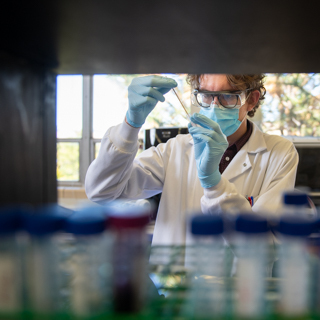Toxicology
Toxicology lab groups in BMED are investigating the molecular, cellular, and physiological effects of environmental agents and their capacity to trigger or exacerbate human diseases involving the respiratory, immune, gastrointestinal and nervous systems.
Understanding the mechanisms and consequences of environmental agents on human health has been a longstanding area of interest that is both shared by a large number BMED faculty and reflects the traditional ties between toxicology and pharmacology often found in Schools of Pharmacy. The University's Center for Environmental Health Sciences (CEHS), which is housed in BMED, has been key to the growth of research in the field environmental toxicology through its active support of collaborative projects, instrumentation cores, and graduate training. BMED faculty are investigating the physiological effects of a wide range of agents (e.g., nanomaterials, industrial chemicals, pesticides, airborne particulate matter), with a focus on their ability to trigger or exacerbate disease processes in the respiratory, immune, gastrointestinal and nervous systems. The potential mechanistic contributions of inflammation to these apparently disparate pathologies also serve as exciting points of interaction between numerous BMED lab groups. Ongoing research in environmental health is also enhanced by work in exposure assessment, genetics, epigenetics, and epidemiology along with population-based research. A list of BMED faculty interests in Toxicology can be found below.
Students working in the CEHS labs have pursued their graduate degrees in:
